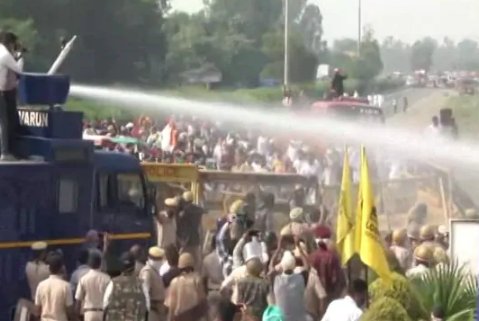New Delhi: As farmers march towards the national capital to voice their discontent over the contentious agri Bills, two of the Bills have already been passed by both Houses of Parliament – the Farmers’ Produce Trade and Commerce (Promotion and Facilitation) Ordinance, 2020 and the Farmers (Empowerment and Protection) Agreement on Price Assurance and Farm Services Ordinance, 2020.
Despite police ‘bandobast’ in place on both sides of the borders, the farmers are eager to be heard.
In Haryana, farmers blocked roads to protest the new agri Bills. Wearing Kurtas, many farmers tried to block roads in Ambala. National Highway 344 which is better known as Ambala-Roorkee national highway is blocked. In Kaithal too, farmers blocked the Ambala-Hisar highway. The story is not very different in Kurukshetra where local farmers blocked key roads to Kurukshetra and Shahabad.
With the matter being politically sensitive, most political parties sided with the farmers. After SAD leader Harsimrat Kaur resigned from the Union Cabinet, Ram Karan Kala, Shahabad MLA of Jannayak Janta Party, an ally of the BJP in Haryana was spotted at a protest site. Inside Parliament, the opposition created a ruckus as the two Bills were being passed.
As organisations like Bhartiya Kisan Union (BKU) are already threatening to march to the capital where the Parliament is in session, Delhi Police has been put on alert mode. The police has increased its patrol and barricades in border areas with Haryana as well as in Ghazipur.
With Punjab Youth Congress along with farmers hitting the Delhi-Chandigarh national highway to take part in a tractor rally headed to Delhi, the police have been asked to be on their toes.
The bone of contention has been the two Bills as well as the Essential Commodities (Amendment) Ordinance, 2020. Though Prime Minister Narendra Modi and BJP President J.P. Nadda both have clarified that the MSP is not going anywhere, farmers’ unions believe the Bills will phase out the MSP and the traditional grain market system. They also claim it to be against the small farmers, something the Centre dismisses.
“It will root out the middlemen,” the Prime Minister recently said in a virtual address. He also said that it will help farmers go barrier-less.
But, there are many commission agents or middlemen that the Centre says will be rooted out, particularly in Punjab who are worried of being rendered jobless. A study says, there are roughly 28,000 registered commission agents, who too are concerned of going jobless.
While giving a historic boost to rural India, three ordinances were promulgated on June 5, 2020 for the benefit of farmers and to transform the agriculture sector. These ordinances were: The Farming Produce Trade and Commerce (Promotion and Facilitation) Ordinance, 2020 to promote barrier-free inter-state and intra-state trade in agriculture produce; The Farmers (Empowerment and Protection) Agreement on Price Assurance and Farm Services Ordinance, 2020 to engage with processors, aggregators, wholesalers, large retailers, exporters; and Amendment to the Essential Commodities Act to liberalise regulatory environment for farmers.
The first two are being passed as Bills in both Houses of Parliament.
MSP has been one of the concerns of many farmers, irrespective of the Centre’s assurance. Many feel farmers will either cease to get the benefit of it or private players may exploit them.
With politics heating up over the matter, Punjab Chief Minister Captain Amarinder Singh said, “These ordinances will cause irreparable damage to farming in the state. The Punjab Vidhan Sabha, in its session held on August 28, 2020, had passed a resolution to withdraw these ordinances.”
He said it was to ensure the continuity of the MSP regime.
However, with many farmers now surpassing the line of static protest and headed to the national capital to be heard, the phase of nuanced negotiation is over. Now, it’s over to the law enforcement machinery.
(IANS)






































